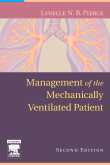|
|
|
| |
 |
|
|

|
 推薦指數:
推薦指數:





|
|
- 內容介紹
|
Management of the Mechanically Ventilated Patient, 2nd Edition
By Lynelle N.B. Pierce, RN, MS, CCRN
544 pages 210 ills
Trim size 6 X 9 in
Copyright 2007
Description
The second edition of Management of the Mechanically Ventilated Patient functions as both an educational manual and a clinical reference for those involved in monitoring, managing, and delivering care to patients requiring respiratory intervention or mechanical ventilatory support. The range of coverage and practical approach in this easy to understand guide provides the nurse and other health care professional the clinical practice information needed to deliver safe and effective respiratory care.
Key Features
Contains cutting-edge coverage of respiratory care to keep nurses and other health care professionals up to date
Includes valuable information on airways, oxygen delivery devices; lung expansion, bronchial hygiene and aerosol therapies
Rich in illustrations, boxes and tables to support understanding of information
Fundamental and advanced, but practical, information about mechanical ventilation from patient selection and application, to monitoring, troubleshooting, and weaning including basic and complex modes
Specialized techniques such as independent lung ventilation and high frequency oscillatory ventilation
Comprehensive appendices provide practical and current information including the latest on drugs
New to this Edition
Covers the newest airways on the market such as tubes that provide for suctioning of secretions above the cuff, thereby potentially reducing the incidence of nosocomial pneumonia
Contains current research on the use of positioning to enhance lung volume, oxygenation, and secretion clearance
Revised headings and subheadings to ensure the reader can readily locate topics of interest
Content markedly expanded on noninvasive ventilation or ventilation without an endotracheal tube, lung recruitment maneuvers, lung protective ventilatory strategies, and prevention of complications of mechanical ventilation such as pneumonia and ventilator induced lung injury
Expanded mechanical ventilation content to include advanced modes, dual control modes and the latest research findings on uses and application of PEEP
New chapter on ventilator graphics and waveform analysis opens up a new area of monitoring for practitioners
Substantial revision of content on weaning from mechanical ventilation includes comprehensive weaning assessment tools and multidisciplinary protocols
All figures are updated to ensure current products and manufacturers
Appendix on Ventilator Withdrawal at End-of-Life including ethical issues and procedural steps
Specialized techniques such as heliox, inhaled nitric oxide, extracorporeal membrane oxygenation including rationale for therapy and information for establishing standards of care
Table of Contents
1. Pulmonary Anatomy
2. Practical Physiology of the Pulmonary System
3. Airway Maintenance
4. Administration of Oxygen, Humidification, and Aerosol Therapy
5. Lung Expansion, Positioning, and Secretion Clearance
6. Mechanical Ventilation: Indications, Basic Principles of Ventilator Performance of the Respiratory Cycle, and Initiation
7. Modes of Mechanical Ventilation
8. Ventilator Graphics and Waveform Analysis
9. Complications of Mechanical Ventilation and Troubleshooting the Patient-Ventilator System
10. Noninvasive Respiratory Monitoring and Invasive monitoring of Direct and Derived Tissue Oxygenation Variables
11. Weaning from Mechanical Ventilation
12. Specialized Techniques in Mechanical Ventilation
Appendices
Appendix I Pulmonary Symbols and Abbreviations
Appendix II Drugs Used In Intensive Respiratory Care
Appendix III Chest Drainage Systems
Appendix IV Ventilator Withdrawal at End-of-Life
|
|
|

